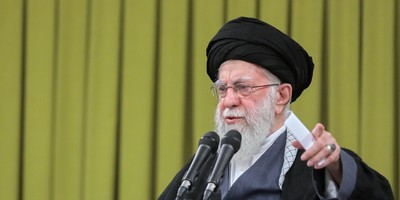After the deadly violence of Charlottesville, Va., the amoral man in the White House failed his morality test. And in doing so, he gave the left a powerful weapon.
But now, a question:
Why did nearly half the electorate and 30 states make Donald Trump president of the United States?
Because he wasn't Hillary Clinton and her pack of cultural and media establishment elitists, who reveled in reminding forgotten Americans that they were deplorables for wanting to reclaim lost jobs and keep control of their nation's borders.
Because he wasn't part of the establishment war party endlessly seeking to spend American blood and treasure in constant and disastrous military intervention around the world.
Because he offered economic hope for a country that had been fed Barack Obama's weak platitudes, even as hope and opportunity fled, and to some extent, Trump has delivered on that.
He also offered strength (or so he said), a willingness to confront the corrosive insidiousness of the politically correct, to fight it and damn it.
But then came the alt-right rally in Charlottesville, with the neo-Nazis and white supremacists, their ridiculous tiki torches and their Ku Klux Klan hatred, ostensibly to protect a statue of the Confederate South.
Confronting them was an angry group of counterprotesters that included violent fascists of the left, allowed by the local police to shut those white boys down, the way the fascist left had been allowed to shut down several conservative speakers at colleges, including at Berkeley.
But this wasn't a college campus in California where young college Republicans could be easily slapped around. This was the South, where history and culture are less malleable. And what happened was inevitable.
Recommended
So President Trump was faced with a question of morality.
All he had to do was be unequivocal in his condemnation of the alt-right mob. His brand as an alpha in a sea of political beta males promised he wouldn't be equivocal about anything.
But he failed, miserably, his mouth and tongue transformed into a dollop of lukewarm tapioca, talking in equivocal terms, about the violence on "many sides."
He then offered another statement, ostensibly to clarify and condemn the mob. But that was followed, predictably, by even more comments, as he desperately tried to publicly litigate his earlier failures.
In doing so, he gave the alt-right all they could dream of.
He said some attending the rally were "fine people."
Fine people don't go to white supremacist rallies to spew hate. Fine people don't remotely associate with the KKK. Fine people at a protest see men in white hoods and leave.
Fine people don't get in a car and in a murderous rage, run others down, including Heather Heyer, who in her death has become a saint of the left.
Fine people don't make excuses. And fine leaders don't leave gray areas behind them. Trump did.
"You have some very bad people in that group, but you also had people that were very fine people on both sides," Trump said at a news conference. "You had people in that group -- excuse me, excuse me -- I saw the same pictures as you did. You had people in that group that were there to protest the taking down of, to them, a very, very important statue and the renaming of a park from Robert E. Lee to another name."
Trump seemed to be going out of his way not to offend the white boys who voted for him. I don't think this is because he's a racist, or that he joins with the neo-Nazis in hating Jews. His daughter is Jewish. Her husband Jared Kushner, a top White House adviser, is Jewish.
But Trump is by nature a flatterer, a tribal thinker, narcissistic enough to love those who love him. The whites at the rally voted for him, and now the alt-right praises him for his tepid commentary.
Trump's failure of Charlottesville -- his failure to condemn the mob immediately in the strongest terms -- has given the left a forceful rhetorical advantage.
You see it in much of the media commentary of social justice warriors. They've taken this tragedy and their public piety and forged it into a blade, to stab their political opponents.
And so, now, the argument is pushed that whites who voted for Trump are all presumed to be racists. It is a theme reflected in much of media that has despised Trump for the sin of denying Clinton the presidency.
But is this even possible? Are tens of millions of people who didn't cast ballots for Clinton in November the enablers of the idiotic alt-right and their disgusting henchmen?
Of course not, yet this is how political rhetoric works. Capturing the moral high ground in an argument may be a bloody climb, but once you're up there, you can stab down in the name of peace and justice.
And victory.
And those Trump voters who cast ballots for him for other reasons -- from wanting conservatives on the Supreme Court to better trade deals -- are forced to defend themselves from the paralyzing charge of bigotry.
This is not a prescription for unifying the country, but it's been expected. It is what happens when an empire's establishment decays, infected by the cynicism of leaders over decade after decade.
The left and right become more violent and strident. Their loud declarations and counter declarations give little refuge to those in the middle. And the president's moral failure over Charlottesville helps feed it.
It is what happens with amoral men who think only in terms of themselves.

























Join the conversation as a VIP Member